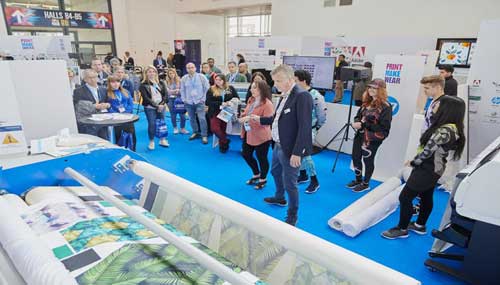FESPA’s fast fashion factory feature, Print Make Wear, a favourite last year, will focus this year on sportswear production. FESPA Global Print Expo 2020 is to be held during March 24-27, in Madrid. Linking to FESPA’s new co-located event, Sportswear Pro, Print Make Wear will display the tools to facilitate customised, sustainable, on-demand production.
The feature will recreate a live end-to-end production process for sports and athleisure garments, as well as host a series of tours led by FESPA’s textile ambassador, Debbie McKeegan.
“Print Make Wear proved to be FESPA Global Print Expo 2019’s most attended feature and it’s not difficult to see why – it’s a vibrant forum where you can immerse yourself in all aspects of garment printing, from design to print and finishing,” says McKeegan. “We want to give our visitors the opportunity to see first-hand how digital print technology, software and automation can revolutionise the production of sportswear and define potential new routes to market.”
As with past editions, Print Make Wear will address every step in the garment production process, starting with colour utilising CAD / CAM, design and prepress, production workflows, grading and nesting, progressing to printing, drying, cutting, sewing, welding and embellishment, culminating in packing and retail display. The feature will act as a physical link between FESPA Global Print Expo 2020 and Sportswear Pro 2020.
This year’s edition includes two workflows running side by side. The first one will exhibit direct-to-garment (DTG) printing onto blank sportswear and athleisure garments, where visitors will be able to order and customise a men’s running shirt or women’s racer back vest and leggings. The second workflow, dedicated to roll-to-roll printing, will replicate the whole garment production process from web-to-print to final delivery, with sample fabrics printed, cut, sewn and packaged on-site. The final printed samples will be displayed in a retail display and worn by models on the show floor.
While Print Make Wear will convey the benefits of print on-demand and customisation in contemporary garment production, sustainability will also be a key area of focus.
“Sustainability is an essential component for future manufacturing technologies across multiple industries and the same goes for sportswear manufacturing,” McKeegan explains. “As the key driver within our industry, sustainability will be heavily reflected across the whole of Print Make Wear. We’ll be highlighting how on-demand manufacturing helps significantly reduce waste. In addition, the majority of fabrics being printed onto are organic in source or recycled textiles and the physical elements of the feature build will be reutilised at future exhibitions.”
There will also be a comprehensive guided tour programme. The tours will provide an in-depth look at all the components that go into DTG and roll-to-roll production, as well as highlighting how customers’ requirements for on-demand customisation can be tackled.
There will also be a series of ‘Experts in Conversation’ sessions that cover a range of topics, including Best practice for colour management in apparel production, Fashion technology and automation, The positive impact of sustainable textile production, and The biggest challenges within sportswear production.
Neil Felton, CEO of FESPA, concluded: “Sports apparel and fast fashion are two of the most dynamic growth applications in our textile printing community. Also, as evidenced by our research, a lot of the trends currently affecting sportswear manufacturing are reflected in specialty print. With this in mind, Print Make Wear is the perfect feature for showing our visitors the points in common between these two exciting industries. We’re confident that, whatever their level of knowledge or investment in garment printing, visitors to Print Make Wear in Madrid will gain a much deeper understanding of the opportunities for process improvement and differentiation.”
Also Read: Digital, textile printing experts to gather at FESPA




















